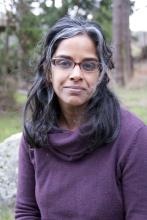Dr. Anu Taranath, faculty in CHID and English, seeks to better understand the relationship between pedagogy and global ethics, especially in relation to study abroad. In 2003 she founded and currently leads a UW program to Bangalore, India on issues of social justice. Lately, Anu has been visiting other programs to deepen critical capacity in both faculty and students to better navigate the personal and social issues that global travel raises.
She recently visited Duke University’s DukeEngage study abroad program in Medellin, Colombia (co-founded by Dr. Tamera Marko, Emerson College and Mr. Jota Samper, MIT) as a consultant. DukeEngage Colombia is a civic engagement project in which a small number of Duke undergraduates are funded to travel to Medellín. Students live with homestay families and work on a video archive with displaced women and their families.
During her week in Colombia, Anu immersed herself in the day to day activities of the program, including homestay family-student interactions, classroom reflection sessions, workshops on blog writing, video crafting and editing, as well as informal time with students, program directors, and local program staff in Medellin. Throughout the visit, Anu and the Medellin program directors conversed on myriad issues, including how we teach and learn about global differences in a more thoughtful and conscientious way.
In any study abroad program, all students experience differences between their own home country and the new location. Experiencing this difference is, in essence, why we encourage travel abroad. What is not universal however, are the ways in which different students experience these differences. Based on how students are perceived and how they imagine their identity, each person’s trip will play out in a different way on account of their gender, sexuality, race, language ability and other social factors. Though a very real dynamic on all programs, formal discussion on the differential impact of global travel on students remains a topic that is often underexplored in our study abroad curricula. To help surface some of these issues for the Duke University students, Anu developed and co-led a workshop on race, privilege and identity to deepen students’ engagement with difference and diversity. Says program director Dr. Tamera Marko, “The workshop transformed our project in a way that not only made our practice more meaningful, it greatly improved our overall video archive project for this summer.” She added, “The students of color in our program—without solicitation from me—told me how much they deeply valued Anu Taranath’s contribution and presence. All the students of color emphasized that such conversations impacted not just the way they saw the study abroad program, but expanded to the rest of their education at Duke and beyond.”
Anu continues to be involved in conversations on pedagogy and global ethics on both a regional and international scale. She recently was selected to participate in a CIEE faculty summit on study abroad and service-learning in the Dominican Republic, and as part of the Fulbright Specialist Roster to collaborate with international universities. Anu will be the keynote speaker for CHIDʼs International Expo on April 24, 2014, a campus event designed to showcase international education work.
